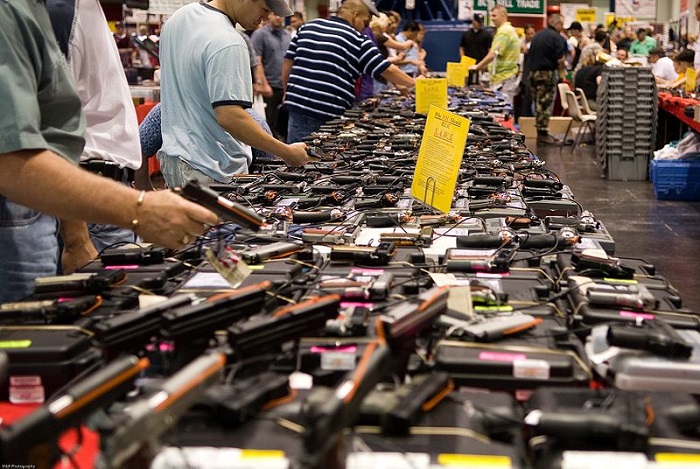Check out my synopsis of I-594: a proposed gun control law that is on the ballot in Washington State this year.
The upcoming election this November is shaping up to be a very important one for gun owners in Washington state. In addition to the normal elections for candidates running for public office, there is another very important measure on the ballot: Initiative 594 (I-594). Though supporters of the law tout it as a simple, common sense, law requiring universal background checks for all firearm sales, the law as written is actually nothing of the sort. In reality, I-594 is actually an extremely complicated regulation that will invade the privacy of law-abiding firearm owners, divert police resources from other tasks and do little to actually prevent criminals from obtaining firearms.
Before I get started, I want to state that I am not a representative of, nor am I affiliated in an official capacity with any political organization that is lobbying for or against I-594. While I am a member of the NRA, I am writing this synopsis of I-594 purely as a concerned private citizen. Also, I am not, nor do I claim to be, a lawyer or a legal expert. Though I am confident in my interpretations of the details of I-594 and other gun laws currently on the books, I do not claim to be the last word them.
What is I-594?
According to Ballotpedia, the following language concerning Washington Universal Background Checks for Gun Purchases, Initiative 594 (I-594) will be on the ballot this November in Washington:
“This measure would apply currently used criminal and public safety background checks by licensed dealers to all firearm sales and transfers, including gun show and online sales, with specific exceptions.
Should this measure be enacted into law?”
Sounds pretty simple: everybody buying a gun in Washington, regardless of the source, must pass a background check. This will close the “gun show loophole” and prevent criminals from buying guns. Everybody (except the criminals) wins. Right?
Unfortunately, it’s not that cut and dry. After reading the details of I-594 (located here if you’re interested), it doesn’t quite live up to expectations and contains several other troubling provisions not enumerated in the short synopsis above.
What Problem is I-594 Actually Solving?
According to many politicians, political pundits, and other supporters of I-594, 40% of guns are purchased without a background check using a “loophole” I-594 will close. Though this sounds like a reasonable proposal on the surface, reality is quite different. In truth, the statement that 40% of all gun transfers occur without a background check has been pretty thoroughly debunked according to FactCheck.org.
For a better idea of how many transfers of firearms occur annually without going through a licensed dealer, one should look no further than the State of Colorado, which recently passed a law similar to I-594 requiring a background check for all transfers of firearms. The “fact” that 40% of all gun sales were conducted without a background check was also used during the arguments for this bill.
Well, the proof is in the pudding: over the course of 2013 (the first year the law was on the books), just over 4% of all firearms transfers in Colorado were between private sellers. Yes, you read that right: 4%, not 40%.
Further, though the idea of “Universal Background Checks” sounds appealing, I-594 wouldn’t actually prevent criminals from obtaining guns. It is already illegal for anyone convicted of a felony or certain misdemeanors (or several other disqualifying characteristics according to 18 U.S.C. § 922(g)), to own or acquire a firearm. Likewise, it is illegal to knowingly transfer a firearm to someone who is prohibited from owning one or to someone whom you have reason to believe will commit a crime with it. Yet somehow, criminals still end up with guns. Why is this?
Criminals, by definition, do not obey the law. Criminals get their guns by stealing them, by using a friend or family member to purchase them on their behalf, or by purchasing them on the black market. All of these actions are already illegal, yet they still happen. The idea that these criminals would suddenly stop obtaining guns simply because a new law requires background checks on all private transfers of firearms is absolutely ridiculous. Criminals will do what they are already doing and ignore the law. I-594 will be nothing more than a minor annoyance (if that) for criminals who are trying to obtain guns.
I-594 Would Divert Scarce Police Resources
Well, what about the commonly used argument that universal background checks will be successful if “they save just one life”? I concede the point that it is absolutely possible that I-594 may prevent a few people who are prohibited from purchasing firearms from obtaining one. IF those people attempt to buy a gun from a private individual, IF they submit to and fail the background check, and IF they give up their quest of obtaining a gun after failing the background check (that’s a lot of “ifs”), I-594 may prevent a few crimes. That’s worth it, right?
Unfortunately, it’s not that simple. Remember: there is no such thing as a free lunch. Implementing and enforcing I-594 is going to require that the police and courts in Washington invest scarce resources: time, resources, and money. I have no doubt that the law enforcement agencies in Washington are doing, and will continue to do their absolute best to continue to serve and protect all of the citizens of the State of Washington. However, their means are limited and they cannot do everything at once.
Think of it this way: how do you evaluate the risk associated with not doing something? Every police officer and prosecutor that is occupied investigating, enforcing, and prosecuting cases related to I-594 is prevented from some other task in the criminal justice system. That is time and energy competing with other tasks such as patrolling high crime neighborhoods, responding to 911 calls, or investigating and prosecuting other, more serious crimes. In short, this diversion of resources to enforce I-594 may actually result in increased crime in other areas due to lack of law enforcement attention.
Because of this, the Washington Council of Police & Sheriffs (the largest law enforcement organization in Washington and those who would actually be enforcing I-594) has announced their opposition to I-594. The law enforcement and legal systems in Washington are already burdened by a heavy workload. Anything that adds to that must be carefully considered and should provide a significant and tangible public safety benefit. As outlined above, I think that I’ve already established that I-594 will likely provide limited (at best) value to the public at large and may actually prove detrimental to public safety by diverting resources from other police work.
Unfortunately, that’s not all the bad news concerning I-594. In addition to providing little tangible public safety benefit, there are several other provisions in I-594 that cause me great concern both as a gun owner and as a private citizen.
What is a “Transfer” According to I-594?
According to Section 3 of I-594, all “sales or transfers” of firearms are subject to background checks. The sale of a firearm is pretty straightforward. However, I’m concerned about how the writers of the law define the transfer of a firearm. Their definition (from Section 2 of I-594) is below.
“Transfer” means the intended delivery of a firearm to another person without consideration of payment or promise of payment including, but not limited to, gifts and loans.
According to this definition, a gift, trade or barter transaction involving a gun would require a background check. On the surface that appears to be fine. However, continued analysis shows that the law is very broadly written and has very narrow exceptions that could criminalize much more behavior than people realize.
Later on in the proposed law, there are several exceptions to the requirement to conduct a background check. These exceptions include a “bona fide gift” between close family members, the temporary transfer of a firearm to prevent death or severe bodily harm, the temporary transfer to a police officer during the course of his or her official duties, while shooting “at an established shooting range authorized by the governing body of the jurisdiction in which such range is located”, the temporary transfer of a firearm to a licensed gunsmith for services or repair, or while hunting (under certain conditions).
According to the definition of a transfer above, I-594 specifically defines loaning a firearm to another individual as a transfer subject to a background check, but does not specify how long the loan must be in order to be a transfer. Since it does not say one way or another, one must assume that ANY transfer of a firearm not covered by one of the enumerated exceptions, no matter for how long, would require a background check. Remember: the law says that a transfer or sale of a firearm (not the transfer of ownership) requires a background check.
According to this line of thinking, allowing a friend to handle and inspect your firearm while inside your home could be considered a transfer that requires a background check. Failure to conduct the required background check is a gross misdemeanor and each gun and each transfer is a separate count punishable with up to 364 days in jail and a fine of up to $5,000.
Supporters of I-594 would accuse me of splitting hairs and state that there is no way that an otherwise law abiding citizen would be prosecuted for simply allowing a friend to inspect one of their firearms without a background check. However, it’s not difficult for me to imagine an anti-gun prosecutor doing exactly that at some point down the road.
Personally, I believe that the bill means exactly what it says and assurances that it would not be enforced in the manner I described above should be ignored. Personally, I do not think it is prudent to risk possible arrest and jail time by hoping that a law is interpreted and implemented in a manner inconsistent with how it is written. Besides, it is not difficult at all to write a law requiring background checks that does not criminalize temporary firearm transfers. Once again, those who don’t believe me should look no further than the State of Colorado.
Though I consider it a flawed piece of legislation overall, the recent background check passed into law by Colorado (House Bill 13-229) contained specific exemptions for the temporary transfer of a firearm for up to 72 hours without the requirement of a background check. Though these exemptions would satisfy the concerns listed above, they are conspicuously absent from I-594.
I-594 Would Severely Restrict Shooting Opportunities
The same is true with allowing a friend to shoot one of your firearms. Yes, shooting at “an established shooting range authorized by the governing body of the jurisdiction in which such range is located” is a specified exception according to I-594. However, there are many places where it is legal to shoot in Washington besides established shooting ranges.
The State of Washington currently permits recreational shooting (which is legally distinct from hunting) in many other places besides established shooting ranges, such as on private property and in State/National Forests. Recreational shooting may be conducted legally in places other than an established shooting range as long as is not done negligently, does not endanger human or animal life, and is not specifically prohibited by that locality.
Making it illegal to shoot a friend’s firearm at a location other than an established shooting range without a background check would make it impractical and inconvenient to shoot anywhere besides an established shooting range. I don’t know how many people shoot outside of established shooting ranges in Washington, but it is not an insignificant number. I’m also sure that a large portion of these people also shoot firearms owned by their friends from time to time. I-594 would make such activity a crime.
There is nothing wrong with wanting to have a discussion on where and how it is legal to shoot recreationally or to attempt to change the laws regarding such activity. However, that is a discussion that needs to be done separately. Sneaking wording that severely restricts recreational shooting on areas besides established shooting ranges into a bill about background checks is underhanded and dishonest.
I-594 Creates Permanent Records of Handgun Transfers
Sometimes what a law doesn’t say is actually more important that what it says. In this case, the details of one of the more concerning implications of I-594 are contained in wording that is not actually in the bill, but is already enshrined in law. As stated above, I-594 requires that every transfer of a firearm must go through a licensed dealer in order to ensure that a background check is conducted.
Well, Revised Washington Code (RCW) 9.41.110 (9)(a-b) requires that all licensed firearm dealers keep a written record of all handgun transfers and that the details of all transfers be reported to the state Department of Licensing. Since I-594 requires that all transfers of firearms be conducted through licensed dealers, by extension, I-594 also requires that all transfers of handguns be reported to the Department of Licensing. Should I-594 pass into law, the State of Washington would have the beginnings of a handgun registration system in place by keeping track of every single handgun transfer in Washington.
I’ve got a couple of problems with this. For one, it’s none of the state’s business what firearms a law abiding citizen owns. Once it is determined that a person is not prohibited from owning a firearm, that should be the end of the government’s involvement in the issue.
I consider a state database of handgun ownership to be a tremendous invasion of privacy akin to the state recording how much money is in a person’s bank account or keeping records of who a person voted for in an election. Even the federal government is prohibited by law from keeping track of such information by 18 U.S.C. § 922(t)(2), which mandates the destruction of all records of background checks conducted by the National Instant Criminal Background Check System (NICS) if the background check comes back clean.
Another issue that I have with the state keeping records of all handgun transfers is the fact that I am not at all confident in their ability to keep that information secure. I doubt that the Washington Department of Licensing would intentionally release handgun records to the public like the State of New York did in 2012. However, that does not mean detailed information about ownership of handguns couldn’t be stolen by a criminal or leaked in an unauthorized manner by an employee.
Criminals steal sensitive information from corporations and government agencies on a regular basis. It is not a stretch of the imagination at all to foresee detailed information regarding who owns handguns getting in the hands of the wrong people. Obviously, this is a public safety hazard and puts law abiding gun owners at risk of being targeted by criminals.
While I recognize the fact that many supporters of I-594 truly believe that the proposed law is a simple, crime fighting regulation, this is actually quite far from the truth. As I’ve demonstrated earlier, not only does I-594 fail to enact any significant obstacles to prevent criminals from obtaining firearms, but it also contains a number of provisions that would harass and invade the privacy of law abiding gun owners. At the same time, implementing and enforcing I-594 could actually end up endangering public safety by diverting police resources from other tasks. In short, I-594 would do little to deter criminals, but would likely make life more difficult for the people it is supposed to protect: law abiding citizens.
Featured Image Courtesy of Wikimedia
Enjoy my synopsis of I-594? Please help me get the word out and share it with with your friends on Facebook and Twitter.
Make sure you follow The Big Game Hunting Blog on Facebook, Instagram, Twitter, and YouTube.
NEXT: 308 vs 30-06 vs 300 WIN MAG: WHICH ONE SHOULD YOU BE HUNTING WITH?
John McAdams is a proficient blogger, experienced shooter, and long time hunter who has pursued big game in 8 different countries on 3 separate continents. John graduated from the United States Military Academy at West Point and is a veteran of combat tours with the US Army in Iraq & Afghanistan. In addition to founding and writing for The Big Game Hunting Blog, John has written for outdoor publications like Bear Hunting Magazine, The Texas State Rifle Association newsletter, Texas Wildlife Magazine, & Wide Open Spaces. Learn more about John here, read some of John’s most popular articles, and be sure to subscribe to his show: the Big Game Hunting Podcast.



Some of the pro I-594 supporters said on there postings that they want it to be illegal for anyone to own a gun. This is a start in the direction to find out who has not just hand guns but rifles as well and what kinds of other guns there buying so when we vote in the next total gun ban bill they will be easier to locate..Personally I feel that would be a big mistake to disarm the law abiding only to give more power to the criminals. After talking with a judge and a couple of police officers about this bill I have learned that the only people this bill was designed to control is the law abiding of this state not the criminals I already voted No on I-594 and yes on 591 if 594 passes it will cost the taxpayers millions and rise the criminal activity. Thank you for post this, I just pray that the people that are being lied to by the media will learn the truth before its to late.